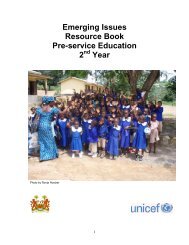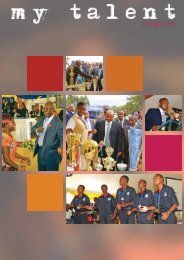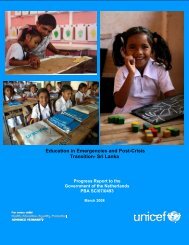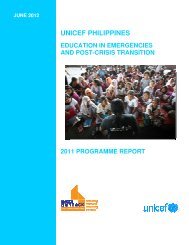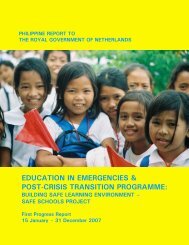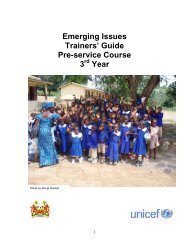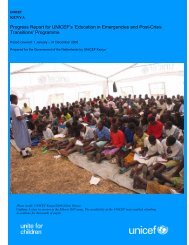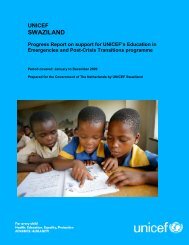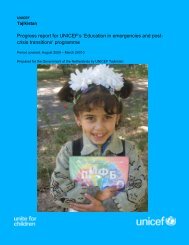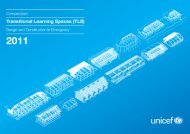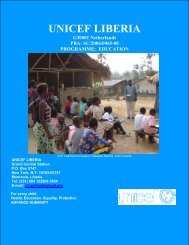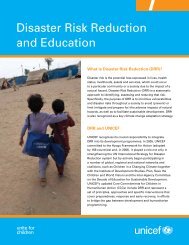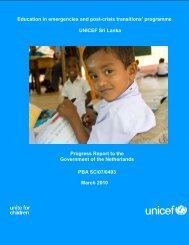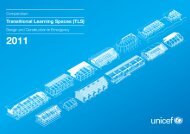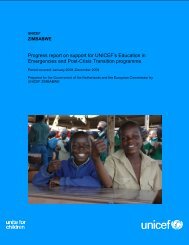Disaster Risk Reduction in School Curricula: Case Studies ... - Unicef
Disaster Risk Reduction in School Curricula: Case Studies ... - Unicef
Disaster Risk Reduction in School Curricula: Case Studies ... - Unicef
You also want an ePaper? Increase the reach of your titles
YUMPU automatically turns print PDFs into web optimized ePapers that Google loves.
78<br />
Section 10.<br />
<strong>Case</strong> 4:<br />
The <strong>Case</strong> <strong>Studies</strong><br />
Russian Federation<br />
The Basics of Life Security subject learn<strong>in</strong>g outcomes are<br />
as follows:<br />
Knowledge:<br />
Holistic comprehension of the world, based on advanced<br />
knowledge of risks<br />
Understand<strong>in</strong>g of the need to protect the environment<br />
<strong>in</strong> order to protect the health of the community and<br />
personal <strong>in</strong>tegrity of <strong>in</strong>dividuals<br />
Knowledge on specific issues: different types of disasters;<br />
consequences of disasters on the security of the <strong>in</strong>dividual,<br />
the community, and the country; governmental systems<br />
<strong>in</strong> place to protect the population aga<strong>in</strong>st disasters; methods<br />
of organisation of the population <strong>in</strong> react<strong>in</strong>g to disasters;<br />
first aid <strong>in</strong> critical situations; rights and duties of the citizens<br />
<strong>in</strong> hazardous situations.<br />
Skills:<br />
Independent determ<strong>in</strong>ation of one’s own goals <strong>in</strong> DRR<br />
and the ability to identify ways to achieve them <strong>in</strong> real life<br />
Increased capacity to protect oneself, the community,<br />
and the country from life-threaten<strong>in</strong>g events<br />
Development of physical and mental qualities relevant<br />
to protect<strong>in</strong>g the lives of oneself, the community<br />
or the country <strong>in</strong> situations of disasters<br />
Attitudes:<br />
Cognizance and responsiveness <strong>in</strong> mak<strong>in</strong>g relevant choices<br />
<strong>in</strong> disaster situations<br />
Predisposition to reduc<strong>in</strong>g human activities that can<br />
have a negative impact on the security of the <strong>in</strong>dividual,<br />
the community, or the country.<br />
Engagement <strong>in</strong> the promotion of a culture of safety<br />
Predisposition to promote all necessary norms for the<br />
re<strong>in</strong>forcement of safety <strong>in</strong> the event of a disaster<br />
Cross-curricular learn<strong>in</strong>g outcomes are as follows:<br />
Knowledge:<br />
Understand<strong>in</strong>g of the notion of safety and of what lies<br />
beh<strong>in</strong>d dangerous and disastrous situations.<br />
Knowledge base sufficient to generalise and compare<br />
the consequences of disasters and to determ<strong>in</strong>e causal<br />
l<strong>in</strong>kages between disasters and their determ<strong>in</strong>ants<br />
of human security.<br />
Formation of a knowledge base for understand<strong>in</strong>g and<br />
process<strong>in</strong>g <strong>in</strong>formation, for generat<strong>in</strong>g ideas, and for<br />
envisag<strong>in</strong>g options so as to improve daily safety and<br />
reduce risks <strong>in</strong> emergency situations.<br />
Knowledge of advisable courses of action to take <strong>in</strong> situations<br />
of natural, technological or social disaster<br />
Skills:<br />
Ability to determ<strong>in</strong>e aims and behaviour <strong>in</strong> situations<br />
of disasters by assess<strong>in</strong>g the situation and local conditions.<br />
Ability to handle, research and analyse <strong>in</strong>formation for risk<br />
reduction us<strong>in</strong>g various resources and new <strong>in</strong>formation<br />
and communication technologies<br />
Ability to convey the results of <strong>in</strong>dividual assessments,<br />
to participate <strong>in</strong> discussions related to disasters and<br />
to convey one’s own op<strong>in</strong>ion to adults<br />
<strong>Disaster</strong> <strong>Risk</strong> <strong>Reduction</strong> <strong>in</strong> <strong>School</strong> <strong>Curricula</strong>: <strong>Case</strong> <strong>Studies</strong> from Thirty Countries



